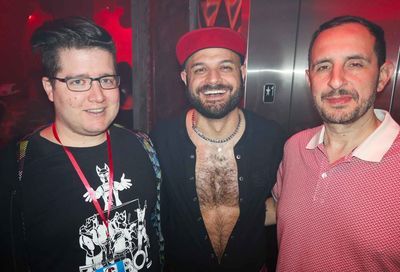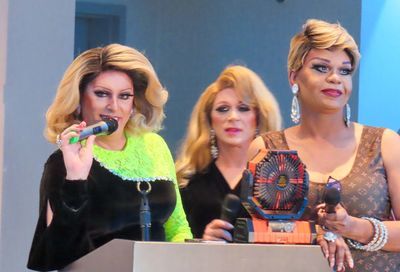If Peter LaBarbera had his way, there would be a caution sign next to all of Franklin Edward Kameny’s 70,000 artifacts documenting the gay rights movement for the past 50 years, recently archived at the Library of Congress.
LaBarbera, founder of the anti-gay organization Americans for Truth (AFT), even suggests some language for such a sign: ”Frank Kameny is a radical who uses hateful rhetoric against his foes.”
Then again, a more general caution may be needed, warning of the ongoing battle over gay rights in America. Frank Kameny says it’s about civil rights; LaBarbera says it’s about homosexuality being a choice, not a civil right.

Kameny
Photography by Todd Franson/File Photo |
LaBarbera is doing what he can to get his point across, starting by asking AFT members and supporters to contact the Library of Congress and express their concerns about the recent acquisition of Kameny’s papers for the library’s collection. LaBarbera operates AFT out of Naperville, Ill., with the help of five volunteers around the country.
”We’re concerned that only one side of Frank Kameny is presented,” LaBarbera says. ”Kameny doesn’t belong in the category of ‘Civil Rights Heroes.’ He can be a very harsh activist. When you write a bunch of Christians and you say, ‘Gay is good, gay is godly, you are neither,’ it’s sort of an in-your-face approach and I want to make sure that is not white-washed in this presentation.”
But many would argue that Kameny’s effective ”in-your-face” approach is exactly how he, and other gay activists, spearheaded the gay rights movement more than 40 years ago.
Kameny is the co-founder of the Mattachine Society D.C., and is also credited with initiating the gay rights movement in Washington. His lawsuit against the federal government’s policy of firing homosexuals was groundbreaking. Along with such items as the picket signs he and others made for a 1965 protest for homosexual civil rights in front of the White House, Kameny’s papers document the dawn of the gay rights movement.
The original picket signs — the slogans include ”Homosexual Citizens Want Equality of Job Opportunity” and ”All Means All” — are now at the Smithsonian’s National Museum of American History.
Kameny says it’s a victorious feeling that drowns out LaBarbera’s anti-gay effort: ”If anybody had ever told us in 1965, making up some of those picketing signs, that they would end up in a collection in the Smithsonian, with Thomas Jefferson’s desk where he wrote the Declaration of Independence, and Abraham Lincoln’s [inkwell], which he used to write the [first draft of the] Emancipation Proclamation, I wouldn’t believe it.
”It took awhile for that to sink in.”
It didn’t take any time, however, for LaBarbera’s feelings to sink in about the archive of Kameny’s papers, which include thousands of letters, government correspondence, testimony, photographs, pamphlets and other memorabilia.
Kameny is already aware of LaBarbera’s anti-gay views.
”A homophobe, he always is. It’s about what’s to be expected of him,” he says. ”But I don’t think it’s going to mean anything in actual results of any kind.”
In response to LaBarbera’s claim that Kameny uses ”hateful rhetoric” to advance gay rights, Matt Raymond, director of communications at the Library of Congress, says, ”The library doesn’t make political judgments in the collections it acquires. Its interest is in acquiring, preserving and making accessible a universal repository of knowledge.”
Kameny’s papers are not yet accessible to the general public. They are currently in the possession of the library’s Manuscript Division, which will organize and catalogue them. They will be labeled by content and subject matter, and made available in manuscript formats at the library. It’s a process that can take several months.
”The library [will use] his collection of writing as a rich and valuable [tool] for future historians who will be seeking to trace the origins of the gay rights movement,” Raymond says. ”Kameny has been central to that movement and in an extraordinary way has chronicled and collected information that is relevant to that.”
But LaBarbera says it’s an unbalanced representation of the gay movement.
”At the very least, they should bring both sides into the presentation,” LaBarbera suggests, before recommending the work of James Dobson, a conservative Evangelical Christian radio host of Focus on the Family. ”Call it pro-gay versus the traditional moral perspective.”
Raymond says including a person’s papers in the library’s collection isn’t about the ”rightness or wrongness” of an individual’s views. ”It’s about how extensively have they collected or helped bring about the collection of primary history documents.”
In Kameny’s case, those documents include photographs of the 1965 picket in front of the White House and the original 1966 policy statement of the U.S. Civil Service Commission addressed to Kameny explaining why gays are ”not suitable for federal employment.”
Kameny says his collection emphasizes how far gays have come.
”It’s not so much me being honored as the fact that it means in a very welcome way, we have moved in from being the fringe of the fringe, into the mainstream, even if we’re controversial.”
LaBarbera says it is unnecessary.
”I don’t believe homosexuality is good behavior,” he says. ”We disagree with the lifestyle, we believe it’s changeable, we believe its about behavior not identity. We don’t believe anybody has to be gay. There’s a whole movement defending it and not that many opposing it, so that’s what we’re doing.”
It’s an ongoing struggle that Kameny continues to fight.
”These people — not just LaBarbera — do not want to see us be thrown the tiniest crumb,” he says, ”and to actually get official recognition, simply is more than they and their homophobia can stomach.”





















